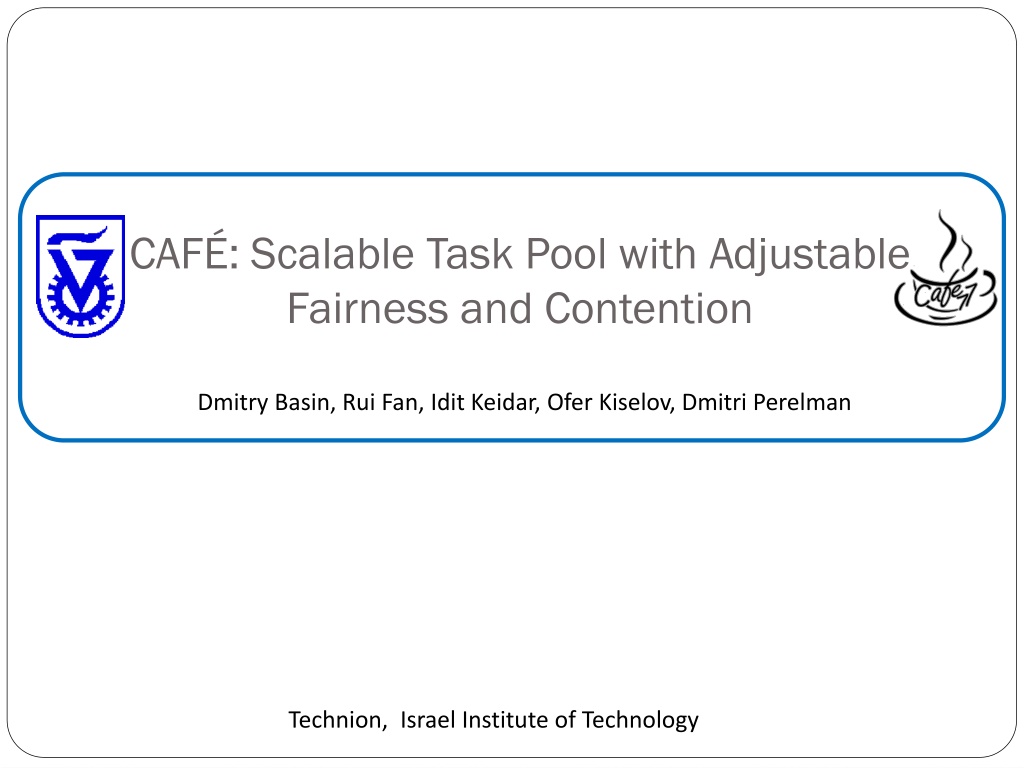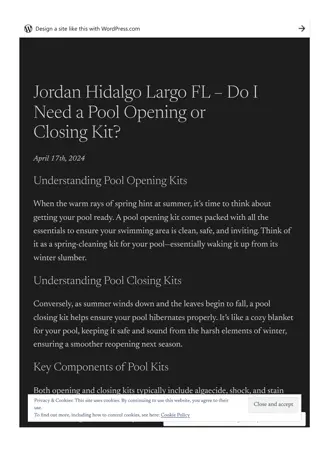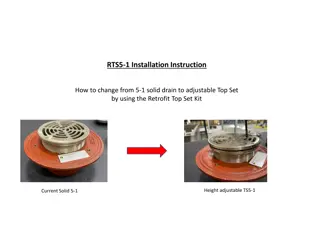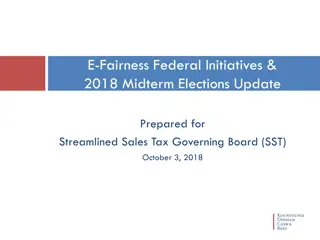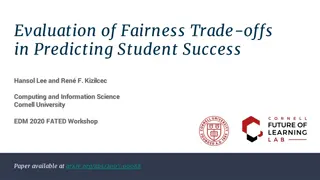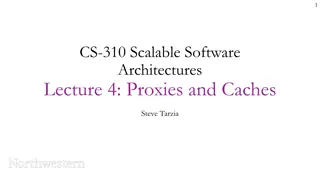Scalable Task Pool with Adjustable Fairness
Explore CAF, a scalable task pool with adjustable fairness and contention, offering a solution to the inherent scalability problems of FIFO queues. The system allows for control over the level of relaxation, providing more fairness or less contention as needed. With a focus on bounded non-FIFO pools and randomized algorithms for put and get operations, CAF presents a unique approach to managing tasks in shared memory environments.
Download Presentation

Please find below an Image/Link to download the presentation.
The content on the website is provided AS IS for your information and personal use only. It may not be sold, licensed, or shared on other websites without obtaining consent from the author.If you encounter any issues during the download, it is possible that the publisher has removed the file from their server.
You are allowed to download the files provided on this website for personal or commercial use, subject to the condition that they are used lawfully. All files are the property of their respective owners.
The content on the website is provided AS IS for your information and personal use only. It may not be sold, licensed, or shared on other websites without obtaining consent from the author.
E N D
Presentation Transcript
CAF: Scalable Task Pool with Adjustable Fairness and Contention Dmitry Basin, Rui Fan, Idit Keidar, Ofer Kiselov, Dmitri Perelman Technion, Israel Institute of Technology
Task Pools Shared Memory Task Pool Producers Consumers Exist in most server applications: Web Servers, e.g., building block of SEDA Architecture Handling asynchronous requests Ubiquitous programming pattern for parallel programs Scalability is essential!
Typical Implementation: FIFO Queue Has inherent scalability problem contention points Shared Memory Do we really need FIFO ? In many cases no! We would like to: Relax the requirement Control the degree of relaxation
CAF: Contention and Fairness Explorer Ordered list of scalable bounded non-FIFO pools Java VM TreeContainer TreeContainer TreeContainer garbage collected TreeContainer size controls contention-fairness trade-off More fairness More contention Less fairness Less contention Tree height 0 Pure FIFO
TreeContainer (TC) Specification Bounded container A put operation can fail if no free space found A get operation returns a task or null if TC is empty Randomized algorithms for put and get operations
TreeContainer Data Structure Complete binary tree Right sub-tree doesn t contain tasks Left sub-tree has tasks Used node without a task Occupied node containing a task Free node
Get/Put Operations Step 1: find target node By navigating the tree Step 2: perform put/get on that node Need to handle races Step 3: update routes Update meta-data on path to node tricky!
TreeContainer Get() Operation Get(): Close to the root updates are rare task by random walk on arrows graph Start from the root Task Step1: Navigate to a Step3: Update routes up to the root Step 2: Extract the task.
TreeContainer Put() Operation Every level of the tree implemented by array of nodes put(): Task Random node Level 0 occupied Random node Level 1 occupied Random node Level 2 occupied Random node Level 3 free
TreeContainer Put() Operation put(): Task Level 0 Step 2: occupy the free node Level 1 Finished Step 1: found free node Level 2 Go to the highest free predecessor Random node Level 3 free
TreeContainer Put() Operation put(): true Close to the root, updates are rare
Races Concurrency issues are not trivial :) Challenge: guarantee linearizability avoid updating all the metadata up to the root upon each operation See the paper
TreeContainer TreeContainer properties Put/Get operations are linearizable wait-free Under the worst-case thread scheduling: Good step complexity of puts When N nodes occupied - O(log2N) whp Does not depend on TC size Good tree density (arbitrarily close to 2h whp)
CAF Data Structures PT GT TC TC TC
CAF Data Structures PT GT TC TC TC TC TC.Put(task) false TC.Put(task) true Allocate and connect new TC
CAF:get get() () from Empty TC PT GT TC TC TC TC TC TC.Get null TC.Get task Garbage collected
CAF: Races PT GT The task is lost for consumers TC TC TC TC Suspended producer thread
CAF: Handling Races Try 1 PT GT Check if GT bypassed TC Move GT back TC TC TC TC
CAF: Races (2) PT GT Consumers can access the task can terminate Task is lost Going to move GT forward TC TC TC TC TC.Get null TC.Put(task) true Consumer thread Producer thread
CAF: Handling Races Try 2 GT PT Read prev, If empty read curr <prev cur> TC TC TC TC Lock-Free. To make it wait-free we do additional tricks.
CAF: Properties Safety: Put()/Get() operations are linearizable Wait-freedom: Get() operations are deterministically wait-free Put() operations are wait-free with probability 1 Fairness: Preserves order among trees
Evaluation Setup Compared pools: LBQ: Java 6 FIFO blocking queue CLQ: Java 6 FIFO non-blocking queue (M&S) EDQ: non-FIFO Elimination-Diffraction Tree Queue Evaluation server: 8 AMD Opteron quad-cores total 32 cores
CAF-13: CAF with tree height 13 CAF evaluation Throughput LBQ: Java 6 FIFO blocking queue CLQ: Java 6 FIFO non-blocking queue (M&S) EDQ: non-FIFO Elimination-Diffraction Tree Queue Throughput as a function of thread number factor of 30 over lock-free implementations
CAF: CAF queue CAF evaluation Throughput LBQ: Java 6 FIFO blocking queue CLQ: Java 6 FIFO non-blocking queue (M&S) EDQ: non-FIFO Elimination-Diffraction Tree Queue . CAF throughput as a function of TreeContainer height
CAF evaluation CAS-failures CAS failures per operation as a function of TreeContainer height
Summary CAF : Efficient Wait-Free With adjustable fairness and contention Thank you
